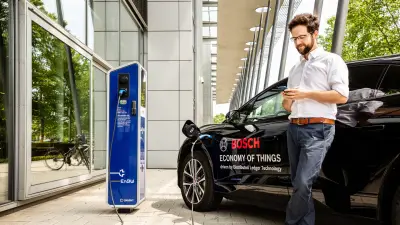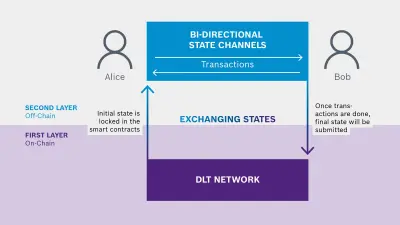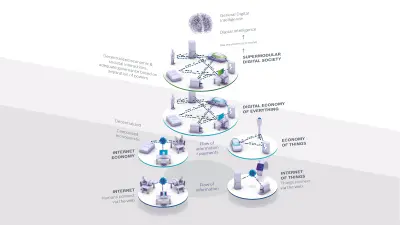Use cases/prototypes
Which concrete examples show how an Economy of Things works? Which applications and prototypes already exist?
Can energy management and trading be implemented decentrally across households?
06.10.2020 | Use cases/prototypes
The team behind the “Economy of Things” (EoT) strategic advanced engineering project at Bosch Research is working on the vision of a data preserving energy trade between households. First of all, this is based on the fundamental idea of the EoT team that, while the Internet of Things (IoT) networks devices, they still aren’t achieving their full potential for sharing economic values in the sense of an EoT. Second, the research team’s work is also founded on the principles of socially fair mechanisms. Taken together, these two ideas could create autonomous energy marketplaces without any central authority. This would be an unprecedented innovation.
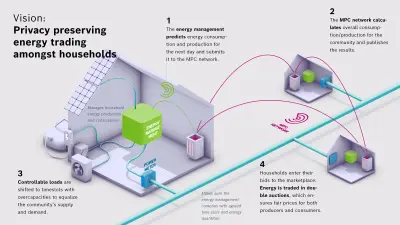
iBlockchain: Consortium working on open IoT marketplace for “order-controlled production”
13.08.2020 | Use cases/prototypes
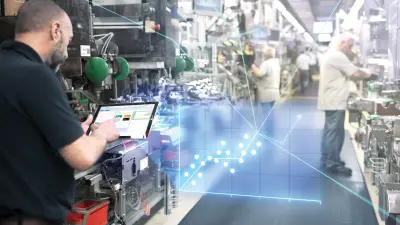
“Order-controlled production” is one of the challenges inherent in Industry 4.0. The article outlines how this scenario can be translated into reality with the help of a fair B2B marketplace that connects producers and clients in the manufacturing industry across the globe. The linked article also showcases the iBlockchain research project and its core use case – an alternative to emerging platform monopolies in the manufacturing industry. The authors, among them researchers from the “Economy of Things” team at Bosch Research, discuss the motivation, technical specifications, and governance for a digital marketplace of this kind. The iBlockchain consortium is currently working on its prototypical implementation.
If the fridge could think
20.05.2020 | Use cases/prototypes
With the installation of a smart fridge in the “Quartierstrom” network, the team of the strategic advance engineering project “Economy of Things” at Bosch Research is showing how networked domestic appliances can play an important role in sustainable energy supply. As a flexible consumer, the refrigerator communicates with the local electricity market and thus adapts its energy consumption to current local conditions. Background: With the “Quatierstrom” project, Switzerland's first local electricity market went into operation in Walenstadt. The residents of the district trade locally produced solar power amongst themselves. Purchases and sales are completed via a blockchain.
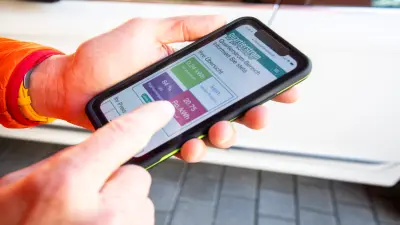
Bosch participates in “showcase of secure digital identities” innovation competition
11.05.2020 | Use cases/prototypes
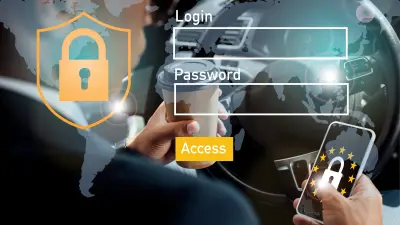
Robert Bosch GmbH, Telekom Innovation Labs of Deutsche Telekom AG, Jolocom GmbH, msg systems ag, ZF Car eWallet GmbH, Fraunhofer IAO and the city of Jena have joined forces in a consortium led by targens GmbH for the “EMIL” project (eIDAS ecosysteM Identity seLf-sovereign) as part of the “showcase of secure digital identities” (“Schaufenster Sichere Digitale Identitäten”) innovation competition organized by the German Federal Ministry for Economic Affairs and Energy. The consortium aims to be selected for the implementation phase in order to standardize the subject of digital identity, put it into practical use and develop new business models. The group is being supported by its associated partners – the city of Ulm and Nimbus GmbH – and its media partners, 0711 Digital GmbH and YAEZ GmbH.
Network protocol “SupplyTree” – grabbing the problem of traceability by the roots
27.04.2020 | Use cases/prototypes
Supply chains are complex constructs with many different participants. This makes it difficult to track individual information such as who produced specific components, which is important in a recall, for instance. In its strategic advance engineering project “Economy of Things” (EoT), Bosch Research has developed a netwerk protocol that has advantages over centralized and blockchain architectures. The "SupplyTree" is a loosely linked, decentralized system based on collaboration. It creates a tamper-proof data chain that does not require a central authority. It is therefore a simple record that solves confidence problems along the supply chain.
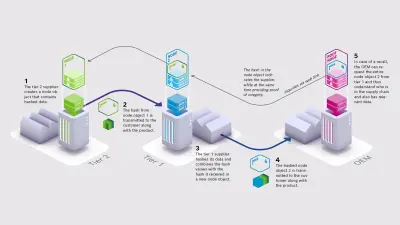
iBlockchain ‒ Using blockchain technologies efficiently and securely for industrial applications
05.12.2020 | Use cases/prototypes
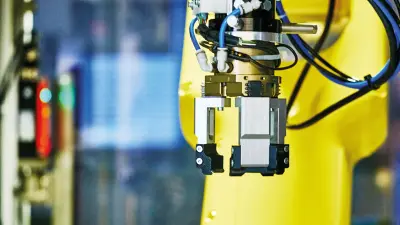
The publicly funded iBlockchain project (short for “Industrial Blockchain”) aims to comprehensively and systematically research solutions for industrial applications based on blockchain technologies. The six research partners in total, led by the coordinating partner Ruhr-Universität Bochum, also include Bosch. The company’s role in the project is to ensure a strong practical focus on industrial manufacturing processes. Firstly, this means developing an Industry 4.0 demonstrator. Secondly, Bosch will be helping design and then implement scalable basic technologies (e.g. second layer).
Bosch and EnBW: Blockchain-based prototype designed to simplify the charging process for electric cars
04.11.2019 | Use cases/prototypes
The idea is to streamline and tailor the entire process to customers’ needs, so they can select, reserve, and pay for recharging services as they see fit. The entire transaction – reservation and payment – is a fully automated blockchain operation.
